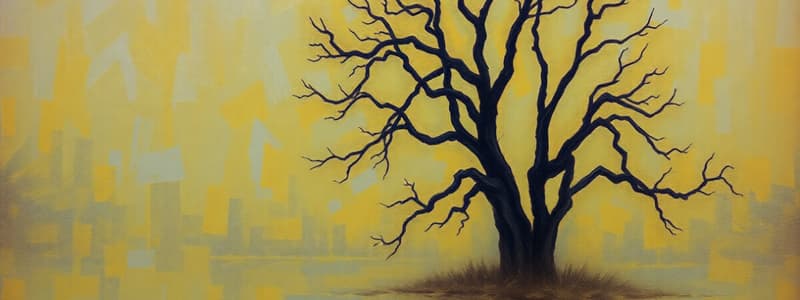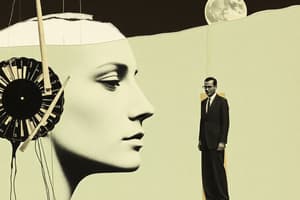Podcast
Questions and Answers
Art is universally defined in the same way across all cultures.
Art is universally defined in the same way across all cultures.
False (B)
The sociological study of art has been well-accepted by critics and art historians for many years.
The sociological study of art has been well-accepted by critics and art historians for many years.
False (B)
Judith Blau emphasizes the focus on material and social conditions in the study of art.
Judith Blau emphasizes the focus on material and social conditions in the study of art.
True (A)
Categories of art should be approached by considering their objective definitions.
Categories of art should be approached by considering their objective definitions.
Effective multicultural curriculum development in art should focus solely on Western art forms.
Effective multicultural curriculum development in art should focus solely on Western art forms.
The inquiry into the purpose of art often leads to intriguing possibilities when discussed.
The inquiry into the purpose of art often leads to intriguing possibilities when discussed.
Anthropologists and sociologists have not significantly contributed to the understanding of art.
Anthropologists and sociologists have not significantly contributed to the understanding of art.
Art is solely valued for its economic worth.
Art is solely valued for its economic worth.
Art can enhance and enrich celebrations and rituals in human events.
Art can enhance and enrich celebrations and rituals in human events.
Art can play a role in both stabilizing and destabilizing cultures.
Art can play a role in both stabilizing and destabilizing cultures.
According to McFee, art has five primary functions.
According to McFee, art has five primary functions.
Art is used to objectify subjective values and emotions.
Art is used to objectify subjective values and emotions.
Arthur Danto's perspective promotes the idea that art's value is determined solely by individual creativity.
Arthur Danto's perspective promotes the idea that art's value is determined solely by individual creativity.
Blau argues that it's acceptable for sociologists to state that 'Art is what an institution defines as art.'
Blau argues that it's acceptable for sociologists to state that 'Art is what an institution defines as art.'
Janet Wolff believes that artistic creativity is fundamentally different from other forms of creative action.
Janet Wolff believes that artistic creativity is fundamentally different from other forms of creative action.
Wolff posits that individual artists play a significant role in the production of their works.
Wolff posits that individual artists play a significant role in the production of their works.
Vasquez claims that artists are not influenced by market tastes and preferences.
Vasquez claims that artists are not influenced by market tastes and preferences.
Art educators need to show students that art is free from ideological and political processes.
Art educators need to show students that art is free from ideological and political processes.
Aesthetic enjoyment and experience are largely determined by individual preferences.
Aesthetic enjoyment and experience are largely determined by individual preferences.
Sociological support exists for the idea that artists produce their works within a shared understanding of purposes.
Sociological support exists for the idea that artists produce their works within a shared understanding of purposes.
Audiences and readers have a passive role in the creation of the finished artwork.
Audiences and readers have a passive role in the creation of the finished artwork.
Becker believes that art is solely the product of individual artists.
Becker believes that art is solely the product of individual artists.
The social status related to art ownership has been a concept observed since the Renaissance.
The social status related to art ownership has been a concept observed since the Renaissance.
Art education should ignore the socialization processes of artists within different societies.
Art education should ignore the socialization processes of artists within different societies.
Bourdieu's studies suggest that art-related cultural participation does not enhance an individual's social power.
Bourdieu's studies suggest that art-related cultural participation does not enhance an individual's social power.
Cross-cultural comparisons of artistic practices are unnecessary according to sociologists.
Cross-cultural comparisons of artistic practices are unnecessary according to sociologists.
Art can function to both maintain and challenge existing cultural values.
Art can function to both maintain and challenge existing cultural values.
Art audiences consist only of critics and historians.
Art audiences consist only of critics and historians.
Art is disconnected from societal influences and operates in a vacuum.
Art is disconnected from societal influences and operates in a vacuum.
Study of the cultural context of art production can reveal insights into social structuring.
Study of the cultural context of art production can reveal insights into social structuring.
Art-related cultural participation has been shown to have no correlation with social status in non-Western societies.
Art-related cultural participation has been shown to have no correlation with social status in non-Western societies.
Art is considered essential because it helps to train our perception of reality.
Art is considered essential because it helps to train our perception of reality.
Dissanayake identified ten general functions served by art.
Dissanayake identified ten general functions served by art.
Art has been described as therapeutic because it allows for the escape from unpleasant feelings.
Art has been described as therapeutic because it allows for the escape from unpleasant feelings.
The contribution of art to order implies that it makes life more chaotic.
The contribution of art to order implies that it makes life more chaotic.
Art helps to provide a sense of meaning or significance in human life.
Art helps to provide a sense of meaning or significance in human life.
Art can sometimes promote habitual responses to everyday life.
Art can sometimes promote habitual responses to everyday life.
Art is a powerful force that shapes attitudes, beliefs, values, and behaviors.
Art is a powerful force that shapes attitudes, beliefs, values, and behaviors.
The work of Lukacs, Balfe, and Wyszomirski primarily focuses on the historical aspects of art.
The work of Lukacs, Balfe, and Wyszomirski primarily focuses on the historical aspects of art.
Art can restore the significance and emotional power of experiences that are often overlooked in daily life.
Art can restore the significance and emotional power of experiences that are often overlooked in daily life.
Art is only important in certain cultures and does not hold universal significance.
Art is only important in certain cultures and does not hold universal significance.
Flashcards
Cultural Diversity & Art
Cultural Diversity & Art
The understanding that art forms and meanings vary across cultures and that these differences are valuable.
Unity in Pluralism
Unity in Pluralism
The concept that we can find common themes and functions of art across different cultures, even if they are diverse.
Art's Multiple Meanings
Art's Multiple Meanings
The word 'art' can refer to specific artworks, the creative process, or a judgment of quality.
Culture-Bound
Culture-Bound
Signup and view all the flashcards
Function Over Form
Function Over Form
Signup and view all the flashcards
Sociological Perspective on Art
Sociological Perspective on Art
Signup and view all the flashcards
Art Education's Importance
Art Education's Importance
Signup and view all the flashcards
Art's Role in Communion
Art's Role in Communion
Signup and view all the flashcards
Art as a Form of Communication
Art as a Form of Communication
Signup and view all the flashcards
Art's Function in Cultural Continuity
Art's Function in Cultural Continuity
Signup and view all the flashcards
Art's Role in Cultural Differentiation
Art's Role in Cultural Differentiation
Signup and view all the flashcards
Art's Impact on Social Change
Art's Impact on Social Change
Signup and view all the flashcards
Artistic Identity
Artistic Identity
Signup and view all the flashcards
Art as a Joint Creation
Art as a Joint Creation
Signup and view all the flashcards
Art and Social Status
Art and Social Status
Signup and view all the flashcards
Art as a social designation
Art as a social designation
Signup and view all the flashcards
Cultural Capital
Cultural Capital
Signup and view all the flashcards
Social Production of Art
Social Production of Art
Signup and view all the flashcards
Patron's Role in Art
Patron's Role in Art
Signup and view all the flashcards
Audience's Role in Art
Audience's Role in Art
Signup and view all the flashcards
Artistic creativity vs. other creative actions
Artistic creativity vs. other creative actions
Signup and view all the flashcards
Art as a Cultural Catalyst
Art as a Cultural Catalyst
Signup and view all the flashcards
Influence of societal factors on art
Influence of societal factors on art
Signup and view all the flashcards
Cross-Cultural Art Comparisons
Cross-Cultural Art Comparisons
Signup and view all the flashcards
Active participation in creating art
Active participation in creating art
Signup and view all the flashcards
Art and Socialization
Art and Socialization
Signup and view all the flashcards
Values and ideologies encoded in art
Values and ideologies encoded in art
Signup and view all the flashcards
Art as a Symbol of Wealth
Art as a Symbol of Wealth
Signup and view all the flashcards
Art discourse and political influence
Art discourse and political influence
Signup and view all the flashcards
Social grounding of aesthetic experiences
Social grounding of aesthetic experiences
Signup and view all the flashcards
Exploring shared understandings in art
Exploring shared understandings in art
Signup and view all the flashcards
Art's Reflection of Nature
Art's Reflection of Nature
Signup and view all the flashcards
Art's Therapeutic Role
Art's Therapeutic Role
Signup and view all the flashcards
Art's Escape Function
Art's Escape Function
Signup and view all the flashcards
Art and Direct Experience
Art and Direct Experience
Signup and view all the flashcards
Art as Essential Practice
Art as Essential Practice
Signup and view all the flashcards
Art's Cultural Preparation
Art's Cultural Preparation
Signup and view all the flashcards
Art & World Order
Art & World Order
Signup and view all the flashcards
Art's Dishabituation Function
Art's Dishabituation Function
Signup and view all the flashcards
Art's Meaning and Intensity
Art's Meaning and Intensity
Signup and view all the flashcards
Art's Role in Multicultural Society
Art's Role in Multicultural Society
Signup and view all the flashcards
Study Notes
What is Art For?
- Art in diverse societies serves many purposes
- Questions of art's function and value are culturally specific
- Art's function is multifaceted
Finding Unity in Diversity
- Western art encompasses various forms (paintings, symphonies, sculptures)
- Art can describe a process, or evaluate a work
- Questions about art are explored: What is art? What is it for? What constitutes good art? Who decides?
- Art is culturally bound; meaning and function vary across cultures.
- Cultural context is vital for understanding artwork
Social Scientists' Perspective on Art
- Art is essential for perpetuating, changing, and enriching culture
- Art conveys values, promotes unity, and reflects social structures
- Art's role in social change and cultural identity
- Art facilitates communication of values, beliefs, and ideas
- Functions of art for various cultures
Broad Themes for Studying Art
- Art reflects the natural world
- Art can be therapeutic and promote emotional well-being
- Through art, individuals can engage in communal activities
- Art, across cultures, may be involved in conveying meaning, social status, values and beliefs.
- Art reflects, records, conveys and influences meaning across time and cultures.
Studying That Suits You
Use AI to generate personalized quizzes and flashcards to suit your learning preferences.




